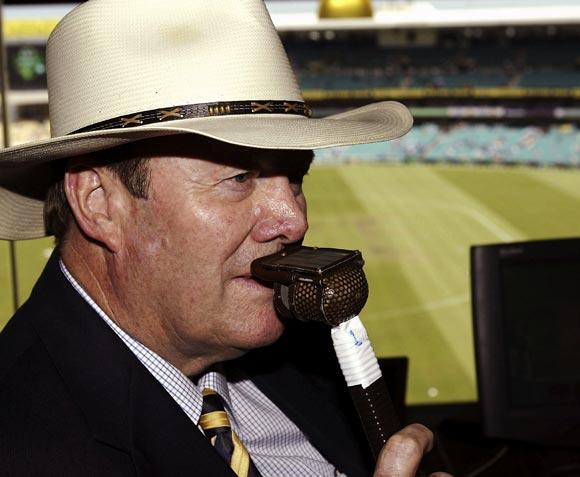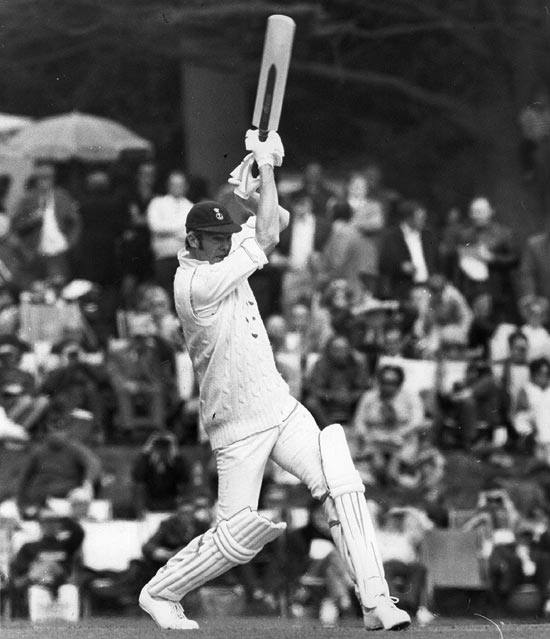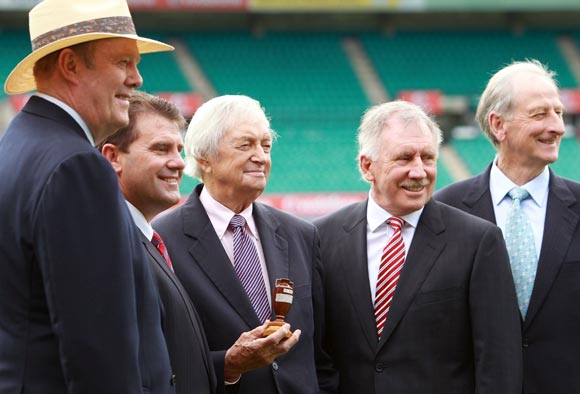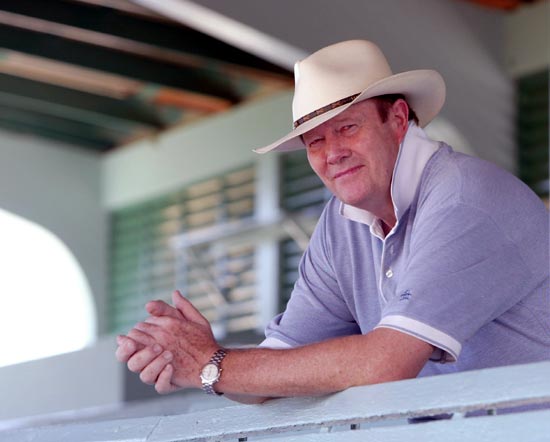Photographs: Hamish Blair/Getty Images
Former England captain Tony Greig, one of the architects of cricket's World Series revolution in the 1970s, died at the age of 66 after suffering a heart attack at his Sydney home on Saturday.
Greig, who was diagnosed with lung cancer in October, was taken to a Sydney hospital but died at about 1:45 pm (0245 GMT).
- Australia's 'Mr Cricket' Hussey bows out on a high
"The staff of the emergency department worked on Mr Greig to no avail," a spokesman at St Vincent's hospital told local media.
A larger-than-life figure standing 6ft 6in (1.98 metres), South Africa-born Greig was an outstanding all-rounder who played 58 Tests for England from 1972-77, scoring 3,599 runs at 40.43 including eight centuries and claiming 141 wickets at 32.20 each. He was also a brilliant slip fielder, taking 87 catches in Test matches.
Greig could bowl at either a lively medium-pace or, on occasion, employ quickish off-spin, using his height and bounce in the latter style to take 13 wickets and win a Test match in the Caribbean.
Greig infused his own aggression and determination into the team
Image: Tony Greig in action for the Duke of Norfolk's XI on April 24, 1972Photographs: Central Press/Getty Images
But Greig and controversy were never far apart and on the same West Indies tour in 1974 he ran out Alvin Kallicharran while the batsman was walking back to the pavilion after the last ball of the day had been bowled.
Technically Kallicharran was out as the umpire had not yet indicated play had officially ended, but after spectators invaded the ground and threatened to riot, the batsman was recalled.
Later that year on the Ashes tour of Australia, Greig sometimes seemed to be playing the Australians on his own as Dennis Lillee and Jeff Thomson blitzed the hapless England batsmen with their pace, menace and bounce.
He was promoted to the captaincy in the following year after England lost the first Ashes Test at home and immediately infused his own aggression and determination into the team who drew the next three Tests against one of the strongest sides in history.
However, in 1976 Greig attracted further unwanted controversy before a series against West Indies when he said he intended to make the tourists "grovel".
The use of the word by a white South African in a time of heightened racial tensions enraged the West Indies, whose fast bowlers noticeably lifted their pace when Greig arrived at the crease on their way to a 3-0 series victory.
Greig's signature lent credibility to World Series Cricket
Image: Portraits of England captain Tony Greig, West Indies captain Clive Lloyd and Australia captain Ian Chappell during the World series in Sydney, on January 1979.Photographs: Adrian Murrell/Getty Images
Greig's biggest impact on the game came after he joined forces in 1977 with late Australian businessman Kerry Packer to set up the breakaway World Series Cricket (WSC) competition.
Media magnate Packer's concept, aimed at securing cricket broadcast rights for his Channel Nine in Australia, shook up the game's world order by pioneering limited overs matches played at night and turning cricketers into full-time professionals.
Greig's signature lent credibility to WSC and he played a key role in recruiting disaffected players to the controversial competition which lasted only two years but permanently changed the face of the game.
"He influenced all those guys from overseas, certainly, and the West Indies to join World Series Cricket and it was great for cricket what he had done," former Australia batsman Doug Walters, who played in the WSC competition, told Sky News.
"Greig was one of the great competitors of cricket...he was someone that really took the fight to Australia, but he took the fight to everybody.
"Win, lose or draw he was the first guy in our dressing room with a couple of beers in his hands."
'World cricket's lost one of its greatest ambassadors'
Image: (Left to right) Tony Greig, Mark Taylor, Richie Benaud, Ian Chappell and Bill LawryPhotographs: Mark Nolan/Getty Images
Greig's recruitment to WSC's cause put him at loggerheads with cricket's conservative establishment and he was stripped of the England captaincy in 1977. His international career ended that year after he had made a typically whole-hearted contribution under Mike Brearley to England's Ashes success at home.
A long-time resident Down Under, Greig later became a cricket commentator with Channel Nine, having been promised a "job for life" by Packer.
A combative and occasionally abrasive character, Greig's booming voice and signature white hat featured on Australian television screens for over three decades, but his battle with cancer prevented him from taking his position behind the microphone for the current 2012/13 season.
"It's a great loss to world cricket. To me personally I'm shattered," said former Australia captain Bill Lawry, who spent decades alongside Greig in Nine's commentary box.
"World cricket's lost one of its greatest ambassadors."
'You have left a great footprint on the world of cricket'
Image: Tony GreigPhotographs: Tom Shaw/Getty Images
Tributes flowed for Greig, who went from being a villain to a highly-respected cricket pundit in his adopted country.
"RIP Tony Greig!! You have left a great footprint on the world of cricket. My condolences to the Greig family," retired West Indies batting great Brian Lara said in a post on his Twitter account.
"Not only was he a wonderful player and a very successful player for England, I think he was a wonderful guy," Australia captain Michael Clarke told Australian television.
England and Wales Cricket Board chief executive David Collier said Greig had been "an extremely talented all-round cricketer and captain".
"He was a giant of a man who played a major role in the changing face of cricket during the 1970s," Collier said in a statement







Comment
article